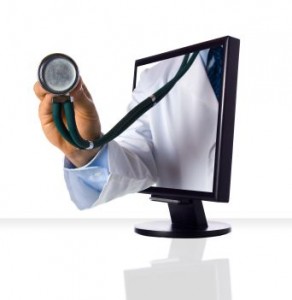Excuse me doctor, can you help me with this…
Putting a doctor, dentist or any other medical professional on Facebook is tricky. Brands often face customer service questions, which can be challenging, but not nearly as challenging as medical issues.
My editorial and social media work has taken me across a wide variety of industries, but there’s no industry more interesting (and flat out baffling) than the medical field. But if there’s one lesson that translates across each one of them, it’s the need and value of transparency.
If you’re considering representing a medical professional on social media, strategy and execution are constantly in motion. And if you’re a medical professional looking for help, these lessons will help you choose the best path for your practice.
Client engagement
 For the medical profession, jumping into social media can feel like drinking from a firehouse. Set your client (or yourself) up for success with a few simple guidelines:
For the medical profession, jumping into social media can feel like drinking from a firehouse. Set your client (or yourself) up for success with a few simple guidelines:
- Work on your social media plan together and monitor execution closely
- Answer every single comment that’s posted to your wall
- Commit to a response time when questions/comments are posted on the wall – max 12 hours during the week and 36 hours on the weekend is a good place to start
- Draft templates for common questions to make the process quicker
For many doctors, Facebook represents a new way to reach patients and potential patients. But if you’re going to engage, commit to continuing to engage. A deserted Facebook Business page is more damaging than a non-existent one.
Best foot forward
Ever show up at work on casual Friday wearing your Saturday garage-cleaning outfit? Casual doesn’t mean sloppy and social media is no different. Start with a beautifully designed landing page and add in press materials and/or images. Then it’s time to get comfortable and start chatting with everyone who visits your page – put on your best bedside manner.
The conversations themselves should be relaxed and lighthearted – casual – but not sloppy or disruptive. Whether you’re representing a client in the medical profession or yourself, respect and care for the profession are priority number one.
The medical advice issue
 Some people think meeting a doctor at a cocktail party makes it acceptable to ask for free medical advice. It’s not. Likewise, a doctor on Facebook does not mean you can roll up your shirt and ask about that weird looking mole. When people do this (and they will) be prepared.
Some people think meeting a doctor at a cocktail party makes it acceptable to ask for free medical advice. It’s not. Likewise, a doctor on Facebook does not mean you can roll up your shirt and ask about that weird looking mole. When people do this (and they will) be prepared.
- Don’t give medical advice.
- Pass along the office number or refer to an online resource where they can get find a doctor
- Don’t give medical advice. Did I mention, ever?
If you’re updating for a client, make it clear that you’re the support team. Taking on the doctor’s voice is false advertising and if you get caught, you could do irreparable damage. Updating as the support team also allows you to gracefully redirect medical inquiries to the office.
Crisis management
Social media can be an evangelistic moment for people who love a brand – but it can also be a place to dump the trash. Before you even begin, map out your crisis path and ensure all parties are in agreement.
Being prepared helps everyone involved with the project understand their role and expectations surrounding it. And when something happens (which eventually it will) you’ll be able to access your plan and tweak for the next time. A measured, controlled response is always easier to learn from than a panicked reaction.
Doctors and other medical professionals who venture onto social media are pioneers. And if you’re lucky enough to work with one brave enough to take on this adventure, plan to learn. A lot.
Got social media questions? Follow me on Twitter, friend me on Facebook or connect with me on LinkedIn – I’m always on.


Great post Julia… My first reaction would be to say that Doctors should not set a professional facebook page, but then I remember that I follow a couple of them on Twitter… and the information they deliver is valuable. So I would agree, having a presence on social network is good for Doctors to make themselves well known, share generic information, provide with generic advices… but all with great care…
Great care is the key, Steph. For most of us a bad day does not interfere with someone’s else health and well-being….Thanks for your comments!
Hi Julia,
Great points. A really tricky area to navigate. Two of the great examples I like to follow are Dr. Jack Newman (breastfeeding expert) and Dr. Jim Sears from The Doctors. Both have communities they’ve built and interact with. Dr. Jim even does Twitter Tuesdays were he answers questions for a few hours every Tuesdays. It’s worked really well for him.
Susie
I would love it if I could just communicate with my doctor’s office by email or text for routine things like billing, appointment rescheduling, test results or prescription refills. But medicine, at least in many parts of the US, is still stuck in the dark ages of technology. They still use fax, for pete’s sake!
I agree, Joe, I’d love to be able to do that too. My hairdresser, who I’ve been in a relationship with for more than 10 years, doesn’t even have email yet… I adore her though so it’s about balancing my need/want for easier communication and her exceptional service. Here’s hoping for a day when the two in sync!
Great post … and it is tricky. I have a background as a Medical Lab Technologist and also worked in IT at local hospitals supporting medical teams. I think they have come a long way online, but have a long way to go simply due to being careful and secure. They use secure Intranets and other sources to access data for themselves and have done so for at least 20 years – but public facing is a bit different. Chiropractors are often on Twitter and a great group to follow. My own doctor has ability to email for appointments, questions, request prescription refills and like through email only, but prescription refills are still done by fax even when the signature is stamped and not live. I would love to see some Doctors blogging of on Facebook with positive posts about living a better life, or reminding us of our yearly medical checkups. But there is a fine line between what can be shared and what might be misconstrued as medical advice. And many simply are too busy. I have read about some great use of SM by doctors — as surveys report most doctors using Facebook for personal use reject patients friend requests. There are more extensive privacy laws in place and are often difficult to stay within boundaries – I like the idea of templates to be used that then ensure do not cross over when engaging online. As easy for a comment to be taken out of context and go viral. Email communication with existing patients is probably the best format still.